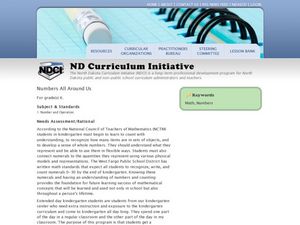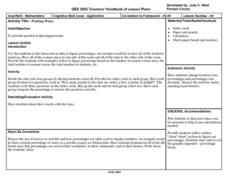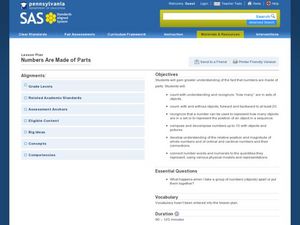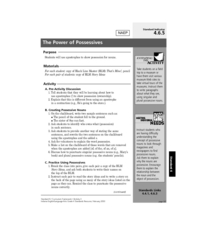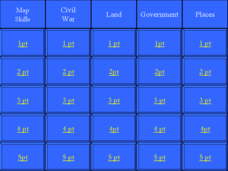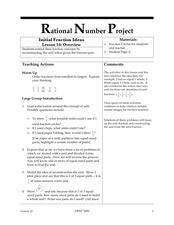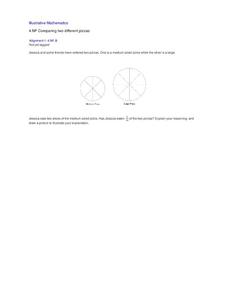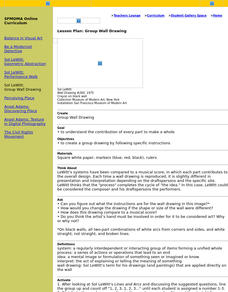Curated OER
Identifying and Using Parts of Speech in Writing: Technology, Word Processing
Students identify and suggest suitable parts of speech to fill in the blanks in a prepared text (the text can easily be tailored to language ability and desired subject). They use word processing to edit the text.
Curated OER
Numbers All Around Us
Students recognize numbers and their value. In this numbers lesson, students observe where numbers and how numbers are used everyday. Students identify why these numbers are important.
Curated OER
Digital Parts of Speech
Students investigate different parts of speech by creating digital skits. In this digital education lesson plan, students collaborate in groups to research the Internet for clips and music that represent the different parts of speech....
Curated OER
A Fibonacci Primer
Upper graders explore the Fibonacci sequence. They examine the characteristics of the Fibonacci sequence, list the properties of the sequence and determine how it connects to Pythagorean Triples. Related thinking questions are included.
Curated OER
I'll Halve S'More, Please!
An episode of Cyberkids is shown, and learners interact with web based activities to discover how fractions are parts of a whole. They study the names of fraction parts, add and subtract fractions, and recognize equivalent fractions.
Curated OER
Parting Ways
Students become part of the solution as they practice figuring percents. The number of men versus women present in the room and their heights can be used to form the basis of this investigation.
Huntington Library
Religion & Spirituality - Exploring the California Missions
The California missions were built with the hope of converting the local Native Americans to Catholicism, but exactly how different were their beliefs to begin with? Through analysis of a series of primary source documents,...
Curated OER
Stirring up Fractions
Second graders practice unit fractions to identify parts of the whole and parts of a set. They utilize a variety of manipulative's including recipe boxes to get them started stirring up fractions. A multitude of books on fractions are...
Pennsylvania Department of Education
Numbers Are Made of Parts
Children play with barnyard animal cards to practice composing and decomposing numbers. With their "secret number" of animal cards in a cup, they shake and spill them onto a barn story board, counting how many animals fall in the barn...
Illustrative Mathematics
Make 9
Learning how numbers are put together as parts and wholes is a big step in building the foundational number sense of young mathematicians. Here, children are given a number less than 10 and are asked to find as many pairs of numbers as...
Curated OER
Parts of Speech: Building Good Sentences
Using technology, 3rd graders will complete a reinforcement project to differentiate between nouns (common and proper), verbs, adjectives, adverbs, and pronouns. Using the teacher-made template, they will create PowerPoint slides on the...
Illustrative Mathematics
Factors and Common Factors
This is an exercise in finding the greatest common factor of two whole numbers. Use in direct instruction or as part of your guided practice. Make up additional problems for home work. It also can be used as a mini-assessment or test...
Curated OER
Organic Mechanic Part I
On day one of the "Organic Mechanic Part I" instructional activity, learners try to remove the waxy coating of an apple and consider pesticides that may be represented by this addition to our food. On day two, they research pesticides...
Curated OER
The Power Of Possessives
The whole class with get when to use an apostrophe after this activity. They use apostrophes to show possession or ownership. This activity includes a discussion starter, a practice exercise, a story activity, and a practice...
Curated OER
Let's Share Equal Parts
Students practice creating parts of a whole by using educational software to illustrate their learning.
Curated OER
Who Has More?
Pupils engage in a lesson that is concerned with the standard of comparing the quantities of whole numbers using different strategies from the concrete to the abstract. They count objects and compare them, use symbols of comparison, and...
Curated OER
Blank Jeopardy
Games are a great way to motivate learners to internalize information.. Using this PowerPoint which is in a Jeopardy format, students can review map skills and facts about the Civil War, famous places, and our government. This is a handy...
Curated OER
Equivalent Fraction Paper Strips
Young learners compare the relative values of fractions by making physical representations. They fold and label strips of paper that are equal in length to represent "one whole" and the equal parts that fractions represent. Also, they...
Curated OER
Initial Fraction Ideas Lesson 16: Overview
Kids will compare creating fractions from pieces of paper to chips. They begin with a fractional part and work back to a whole. Then order fractions from smallest to largest. They also complete a worksheet to find the missing pieces to...
Alabama Learning Exchange
Understanding Fractions
Young learners explore fractions and demonstrate parts of a whole by using a candy bar and a piece of paper and dividing both into equal parts. Included is a worksheet that requires youngsters to color in half of each polygon shape. Some...
Illustrative Mathematics
Comparing Two Different Pizzas
What better way to learn about fractions than with a couple pizzas? Help Jessica figure out how much of the pizza she has eaten, while teaching your class that fractions refer to a specific whole amount. This problem will be challenging...
Curated OER
Group Wall Drawing
Students create a group wall drawing that demonstrate the contributions that each part makes to the whole.
EngageNY
Percent of a Quantity
Visualize methods of finding percents. Classmates find a percent of a quantity using two methods including a visual model in the 26th lesson in a series of 29. By the end of the lesson, scholars find percents given a part and the whole...
Curated OER
Patterns in the Multiplication Table
Explore patterns in the multiplication table in order to deepen your third graders' understanding of this essential skill. Implement this activity as a whole-class lesson, allowing students to work in pairs or small groups to support...
Other popular searches
- Fractional Parts of a Whole
- Parts of a Whole
- Fractional Parts to Whole
- Fractions as Parts of a Whole
- Parts to the Whole
- Fractions Parts of Whole
- Fractions Parts of a Whole
- Fractional Parts of One Whole
- Parts to a Whole
- Math Whole and Parts
- Shaded Parts of a Whole
- Parts and Whole

